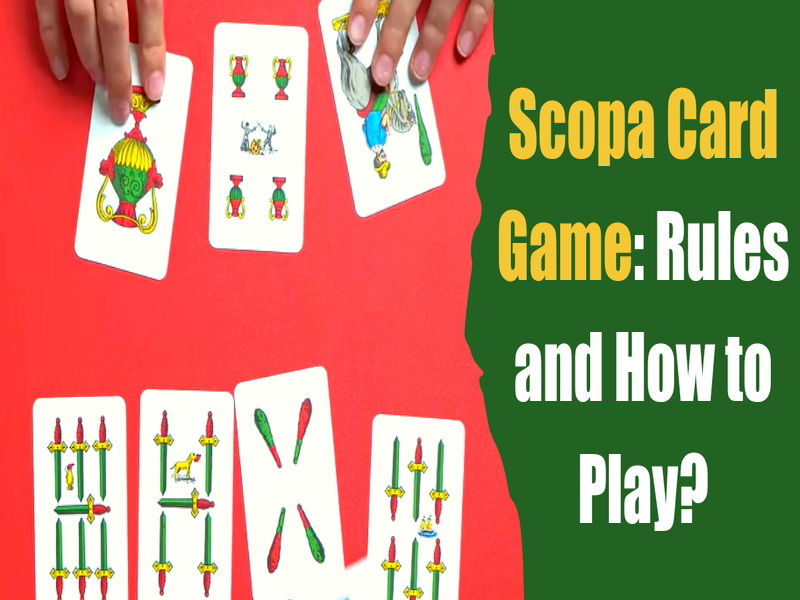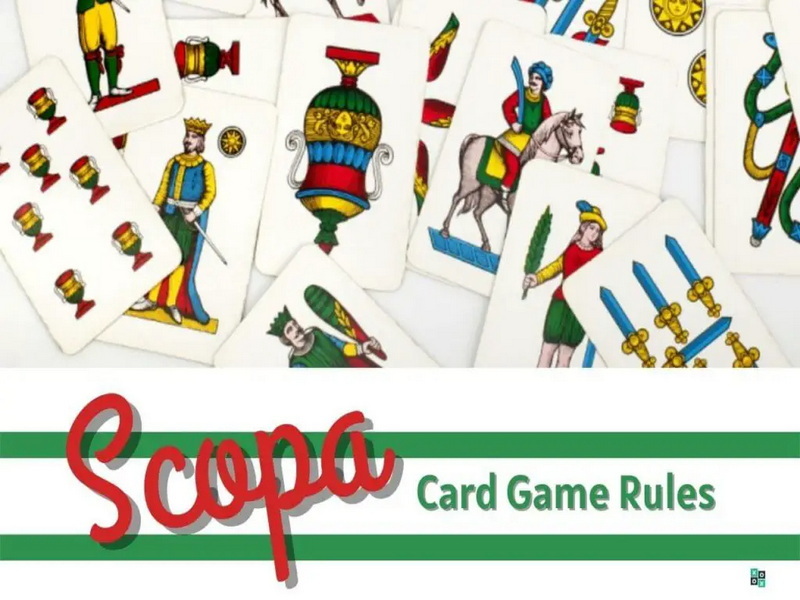Content Menu
● Overview of Scopa
● Setup
● Gameplay Mechanics
● Scoring System
>> Strategies for Success
● Common Variations
● Cultural Significance
● Tips for Beginners
● Conclusion
● Frequently Asked Questions
>> 1. What is the objective of Scopa?
>> 2. How do you score points in Scopa?
>> 3. Can Scopa be played with more than four players?
>> 4. What happens if no captures are possible during my turn?
>> 5. How do I improve my chances of winning at Scopa?
● Citations:
Scopa is a traditional Italian card game that has captivated players for generations. Known for its blend of strategy and luck, Scopa is played with a unique 40-card deck and can accommodate two to four players. The objective of the game is to score points by capturing cards from the table and achieving specific combinations. This guide will walk you through the rules, strategies, and nuances of playing Scopa, ensuring you have a comprehensive understanding of this engaging game.

Overview of Scopa
Scopa, which translates to "sweep" in Italian, is not only a fun game but also a social activity that brings friends and family together. The game is played with a special deck that consists of four suits: cups, coins, swords, and clubs. Each suit contains cards numbered from 1 to 7, along with three face cards: the King (Re), the Knight (Cavallo), and the Jack (Fante).
Key Objectives:
- Capture as many cards as possible.
- Aim for specific scoring combinations.
- Achieve "Scopas" by capturing all cards on the table in one turn.
Setup
Before starting a game of Scopa, players need to prepare the deck and establish some ground rules.
1. Deck Preparation: Use a 40-card Italian deck. Remove all 8s, 9s, and 10s if using a standard deck.
2. Player Count: Scopa can be played by 2 to 4 players. In a four-player game, players typically form teams with partners sitting opposite each other.
3. Dealing Cards:
- For two or three players: Deal three cards to each player and place four cards face up in the center of the table.
- For four players: Deal nine cards to each player and place four cards face up in the center.
4. Objective Setting: Players agree on a target score to win the game (commonly 11 or 21 points).
Gameplay Mechanics
The gameplay of Scopa is straightforward yet strategic. Here's how it unfolds:
1. Taking Turns: The player to the dealer's left starts and play continues clockwise. Each player must play one card from their hand during their turn.
2. Capturing Cards:
- A player can capture cards from the table by matching their card's value with one or more cards on the table.
- For example, if a player plays a 5, they can capture another 5 or any combination of cards that sum up to 5 (e.g., a 2 and a 3).
3. Making a Scopa: If a player captures all cards on the table with one card, they achieve a "Scopa," earning an additional point at the end of the round.
4. If No Capture Occurs: If no captures are possible or chosen, the player must place one card from their hand onto the table.
5. Drawing New Cards: After each player has played their three cards, the dealer replenishes their hands by dealing three new cards from the draw pile until all cards are played.
6. Ending a Round: The round concludes when all cards have been played. Players then tally their points based on captures made during gameplay.

Scoring System
Understanding how scoring works in Scopa is crucial for developing effective strategies:
- Basic Points:
- Each Scopa scored earns 1 point.
- The player or team with the most total captured cards earns 1 point.
- The player or team with the most coins (denari) captured earns an additional point.
- Capturing the "settebello" (the seven of coins) earns another point.
- Primiera Points: At the end of each round, players calculate their Primiera scores based on specific high-value cards captured:
| Card Value | Points |
| Seven | 21 |
| Six | 18 |
| Ace | 16 |
| Five | 15 |
Players tally these points at the end of each round to determine who wins that round.
Strategies for Success
While luck plays a role in Scopa, employing effective strategies can significantly enhance your chances of winning:
- Maximize Captures: Always aim to capture valuable cards while considering potential future moves.
- Achieve Scopas: Focus on clearing the table whenever possible; achieving multiple Scopas can lead to significant point advantages.
- Track Played Cards: Keep mental notes of which cards have been played to anticipate opponents' moves and strategize your captures accordingly.
- Strategic Discarding: When discarding cards onto the table, consider how your moves might set up your opponents for future captures.
- Prioritize High-Value Cards: Target high-scoring cards like sevens and aces early in the game to secure an advantage.
Common Variations
Scopa has several variations that can alter gameplay dynamics:
- Scopone: A team variant where players work in pairs and play with nine-card hands.
- Scopone Scientifico: A more strategic version where no cards are revealed initially; players must deduce opponents' hands based on gameplay.
- Escoba: A Spanish variant where players capture cards that add up to fifteen instead of matching values directly.
Cultural Significance
Scopa holds significant cultural importance in Italy. It is often played during family gatherings, festivals, and social events. The game's simplicity makes it accessible to people of all ages, allowing it to be passed down through generations as both a pastime and a means of bonding among family members.
In Italy, you will find Scopa being played in cafés and homes alike. It serves not only as entertainment but also as an avenue for social interaction and friendly competition. The game's popularity has led to various tournaments held across Italy, showcasing skilled players who compete for titles in local communities.
Tips for Beginners
If you're new to Scopa or looking to improve your skills, here are some helpful tips:
- Learn from Others: Observing experienced players can provide valuable insights into strategies and tactics that may not be immediately obvious.
- Practice Regularly: Like any card game, practice is key. The more you play Scopa, the better you'll understand its nuances and develop your strategies.
- Stay Calm Under Pressure: As with any competitive game, emotions can run high. Keeping a level head will help you make better decisions during play.
- Engage with Your Opponents: Part of what makes Scopa enjoyable is its social aspect. Engage in light banter with your opponents while playing; it enhances enjoyment without detracting from focus on strategy.
Conclusion
Scopa is more than just a card game; it's an engaging experience that combines strategy, skill, and social interaction. By understanding its rules, gameplay mechanics, scoring system, and effective strategies, you can enjoy this classic Italian game while also enhancing your chances of winning against friends and family. Whether you're new to Scopa or looking to refine your skills, practicing these concepts will surely lead you toward mastery.

Frequently Asked Questions
1. What is the objective of Scopa?
The main objective is to score points by capturing as many cards as possible from the table while achieving specific combinations like Scopas.
2. How do you score points in Scopa?
Points are scored through capturing cards, achieving Scopas, collecting coins, securing high-value cards like sevens, and calculating Primiera scores at round's end.
3. Can Scopa be played with more than four players?
Yes, while traditionally played with two to four players, variations exist for larger groups by forming teams or altering hand sizes.
4. What happens if no captures are possible during my turn?
If no captures are possible or chosen during your turn, you must place one card face-up on the table without capturing any cards.
5. How do I improve my chances of winning at Scopa?
To improve your chances of winning at Scopa, focus on maximizing card captures, tracking played cards effectively, prioritizing high-value captures like sevens and aces, and achieving multiple Scopas throughout gameplay.
Citations:
[1] https://www.pagat.com/fishing/scopa.html
[2] https://www.officialgamerules.org/card-games/scopa
[3] https://www.youtube.com/watch?v=OkB0scNm2ws
[4] https://learnplaywin.net/scopa-card-game-strategy/
[5] https://en.wikipedia.org/wiki/Scopa
[6] https://www.seeyouinitaly.com/italian-card-games/scopa/
[7] https://winning-moves.com/images/scopa%20rulesv2.pdf
[8] https://www.thespiel.net/files/scopa-rules.pdf
[9] https://www.reddit.com/r/boardgames/comments/tb4meq/you_should_play_scopa/
































